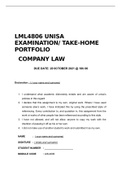LML4806 UNISA
EXAMINATION/ TAKE-HOME
PORTFOLIO
COMPANY LAW
DUE DATE: 20 0CTOBER 2021 @ 18h:00
Declaration : I,( your name and surname)
1. I understand what academic dishonesty entails and am aware of unisa’s
policies in this regard.
2. I declare that this assignment is my own, original work. Where I have used
someone else’s work, I have indicated this by using the prescribed style of
referencing. Every contribution to, and quotation in, this assignment from the
work or works of other people has been referenced according to this style.
3. I have not allowed, and will not allow, anyone to copy my work with the
intention of passing it off as his or her own.
4. I did not make use of another student’s work and submitted it as my own.
NAME : ( your name and surname)
SIGNTURE : ( intials and surname)
STUDENT NUMBER :
MODULE CODE : LML4806
, DATE : 20 October 2021
QUESTION 1
With reference to the Companies Act 71 of 2008 and the facts provided, advise
Oliver whether his arguments hold merit, and whether the ordinary resolutions
were validly passed at the meeting.
1.1 If every shareholder of a company (other than a state-owned company) is also a
director of the company, any matter that is required to be referred by the board to the
shareholders for decision may be dealt with in terms of section 57(4) of the
Companies Act 71 of 2008. The effect of this section is that a matter may be referred
by the board to the shareholders without notice or compliance with any internal
formalities. However, this is subject to the Memorandum of Incorporation which may
provide otherwise. Therefore, as all the shareholders of Exclusive Properties (Pty)
Ltd are directors of the company, section 57(4) of the Companies Act 71 of 2008
would be applicable, unless the Memorandum of Incorporation provides otherwise.
Section 57(4) requires the following:
Every person must be present at the board meeting when the matter was referred
to them in their capacity as shareholders. A sufficient number of persons must be
present in their capacity as shareholders to satisfy the quorum requirements as set
out in section 64 of the Companies Act. A resolution adopted by the shareholders be
supported by shareholders holding at least the percentage of shares required for
adopting an ordinary resolution at a properly constituted shareholders’ meeting.
In this case, Oliver was not present at the meeting. Therefore, the first proviso is not
satisfied because not every person was present at the board meeting when the
matter was referred to them in their capacity as shareholders.
The default position for a quorum to be satisfied is that at least 25% of all the voting
rights eligible to be exercised in respect of at least one matter to be decided at the
meeting must be present before the meeting may start. Since four out of five





